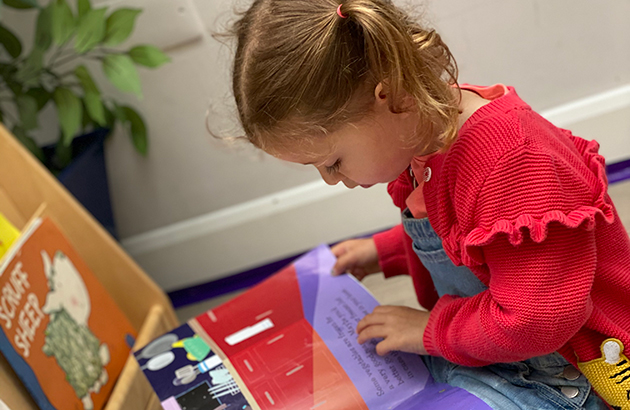At Swinbrook House Nursery we create a carefully structured, challenging, fun environment, full of opportunities for children to experiment and initiate their own learning activities, at their own pace, extending their knowledge and interests. Our team observes, evaluates, assesses and delivers these well-planned activities to all age groups, thereby developing independence and building up their self-esteem, in preparation for confident progression to the next level of learning.
We do this through a balance of adult-led and child-initiated activities supporting our children to explore a wide range of topics through play. We use open ended questioning to promote active learning and critical thinking, increasing the ability of children to offer appropriate responses and extend their own learning.
We plan the curriculum in line with the EYFS and look closely at the needs of the individual child. We support every child to progress successfully through the developmental stages; having a go, discovering, and thoroughly enjoying learning alongside their peers.


Cygnet Class
Our lovely toddler class for children 12-30 months
The children start to explore the world around them in different ways. We introduce the names of colours, explore more mark making and engage in active role-play and construction activities. The children are slowly starting to become more independent and enjoy hanging up their coat on their peg and placing their art work in their drawer ready to show their loved ones at home time.
We encourage sensory play providing a large range of fun and engaging hands on learning opportunities; from moulding playdough, finding numbers in shaving foam and mark making with leaves and sticks to pouring sand into containers and finding letters hidden in gloop. Whilst engaged in these activities the children are introduced to new textures and new words to add to their ever-expanding vocabulary. The children also increase their fine motor skills through activities such as threading beads onto string, completing simple puzzles and picking pom poms up with tweezers.
Imaginative play really starts to come alive within the children during this time. They will start to use the small world play such as animals and cars for their intended purpose and start to use them in their play. Dressing up starts to have more meaning as does acting out different characters in our role-play corner. There are lots of singing and story times to encourage the children’s vocabulary, increase their attention spans and to provide the opportunities for them to make their own choices, selecting their favourite story or rhyme. Mark making and early writing is encouraged with painting, drawing in the sand, gloop and much more.
The age of two is a prime time for toilet training and we are here to support parents through the transition. We ask parents to let us know when they are considering training so we can help.

Swan Class
Our lovely preschool class for children 30+ months and up
The children learn to become more independent in everyday life, start to explore letters and numbers in more depth and gain confidence in their ability to communicate with their peers and teachers about their wants and needs.
We explore more letter sounds, recognising the letters visually and matching the phonetic sound, using the Read, Write Inc programme to develop the children’s skills. Once we have increased the children's fine motor strength and they have a more secure pencil grip, we introduce early writing and name writing. We secure these skills through activities such as ‘Dough Disco’, to strengthen their hands, threading beads onto string or using tweezers and pegs to improve hand-to-eye coordination.
Children usually have some understanding of numbers on arrival. We help them start to understand the value of these numbers, eg. 1:1 correspondence, more and less, through fun activities from rolling a dice and jumping the number of dots shown to playing hopscotch in the park. We explore shape and space by looking at round/straight objects, introducing basic shape names through play, eg. the wheels on the cars are circles. To develop spatial awareness we use our physical play outdoors and our yoga sessions.
We encourage the children to help themselves as much as possible with self-dressing, toileting and choosing the resources they would like to explore.
Early Years Foundation Stage curriculum areas:
Prime: Personal, Social and Emotional; Physical Development; Communication and Language.
Specific: Literacy; Mathematics; Understanding the world; Expressive Arts and Design.
The characteristics of learning: Playing and Exploring; Active Learning; Creating and Thinking Critically; they are the ways in which your child engages with other children and adults and their environment, and they support your child to become an effective and motivated learner.
